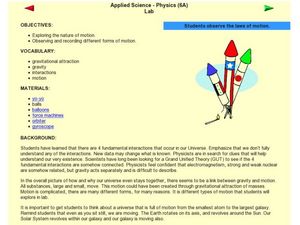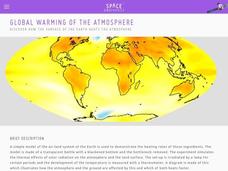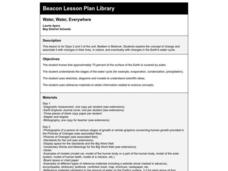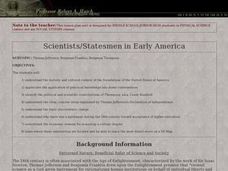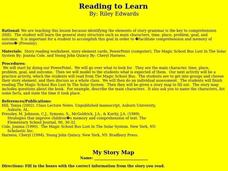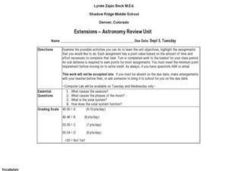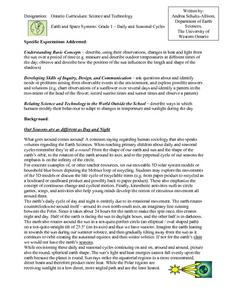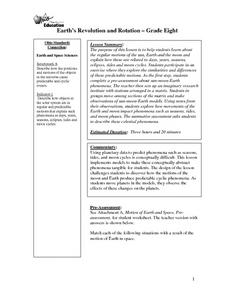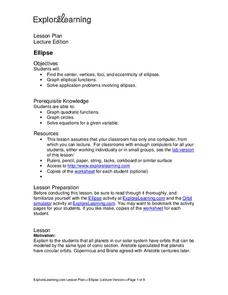Curated OER
Measuring Temperature
Young scholars conduct an experiment using the steps of the scientific method. In this scientific method lesson, students experiment with temperature and record their findings using the scientific method. Young scholars complete a data...
Curated OER
Water Cycle Bag
Students enclose water in an airtight bag and leave it in a warm area to view the water cycle. In this water cycle lesson plan, students observe evaporation, condensation, and precipitation. They then discuss what they learned about the...
Curated OER
Motion Experiment
Young scholars experiment with the laws of motion. In this motion lesson, students explore Newton's Laws of Motion. Young scholars work in groups experimenting with different objects and observing different types of motion.
Curated OER
Impact Craters: Holes in the Ground!
Students simulate crater formation through a lab activity. In this space science lesson, students calculate how much energy is transferred during meteorite impact. They identify different factors affecting the size and depth of craters...
Curated OER
Circles to Spheres
Students investigate circles and spheres. In this space shapes lesson plan, students compare and contrast two-dimensional and three-dimensional shapes. Students investigate the relationship between plane and space shapes.
Chicago Botanic Garden
Micro-GEEBITT Climate Activity
A truly hands-on and inquiry based learning activity bridges all the lessons in the series together. Beginning with a discussion on average global temperatures, young meteorologists use real-world data to analyze climate trends in order...
Curated OER
Exploring the Water Cycle
The water cycle is one of earth's most easily observable processes, but demonstrating each step within classroom walls can be a challenge. Through a series of videos and quick demonstrations, cover each aspect of the hydrologic cycle in...
Ventura County Air Pollution Control District
Effects of Global Warming
Your learners have probably heard of climate change, but do they really understand what it is? Study the history, details, and future implications of global warming and the greenhouse effect with a set of activities designed for an...
Virginia Department of Education
Go with the Flow
How does nature's hierarchy relate to our local human environment? Answer this question, along with others, as the class visually depicts the natural hierarchy provided by nature. Pupils discuss each piece of the pyramid and its energy...
University of Connecticut
Building Your Own Biosphere
On September 26, 1991, four women and four men entered the scientific experiment, Biosphere 2; the doors were sealed for two years in order to study the interactions of a biosphere. In the activity, scholars explore biospheres by...
Space Awareness
Global Warming of the Atmosphere
Scientists know the amount of carbon dioxide in the atmosphere today is higher than at any point in the last 800,000 years. Scholars learn about the amount of thermic radiation absorbed by air and what happens to the rest of the...
Curated OER
Scientists and Statesmen in Early America
Explore the historic and cultural context of the foundations of the United States of America. They identify the political and scientific contributions of early American scientists.
Curated OER
Earth, Moon, Mars Balloons
Students demonstrate size and orbits of Earth, Moon, and Mars. In this space science lesson plan, students will use balloons to show how the size and distance between the planets and satellite compare.
Curated OER
Reading to Learn
Students complete story maps in this lesson. Students read "The Magic School Bus", and get into groups to choose their story element. Each group shares their information with the class. They then complete a story map for a book read...
Curated OER
Extensions - Astronomy Review Unit
Students participate in a review unit in Astronomy using the Layered Curriculum. This allows them to take charge of the type of assessment that is given. The method also allows better differentiation of instruction to occur.
Curated OER
Science: Daily and Seasonal Cycles
First graders use their observations to describe daily and seasonal cycles. through a demonstration using a suspended ball and flashlight, they determine the time of day in various locations. Next, 1st graders participate in a...
Curated OER
Summarize This!
Students explore how to summarize a reading passage. They read non-fiction books. Students use a Venn Diagram to compare and contrast the two animals they read about. They write a summary using the information in their Venn Diagram.
Curated OER
The Sun: An Introduction
Students write entries in their Science Journals as they explore the Sun.
Curated OER
Expanding Children's Geographic and Economic Worlds
Learners learn their addresses and gain a sense of connection between their neighborhood and the rest of the world and the universe.
Curated OER
Earth's Revolution and Rotation
Eighth graders investigate the regular motions of the sun, Earth and the moon and explain how these are related to days, years, seasons, eclipses, tides and moon cycles. They participate in an exercise where they explore the...
Curated OER
Ellipse
Students explore the concept of ellipses including finding the center, vertices's, foci and eccentricity. They assess how to graph elliptical functions and solve application problems involving ellipses. This assignment is to be completed...
Curated OER
Ellipse
Students find the center, vertices, foci, and eccentricity of ellipses using the subscriptions website www.explorelearning.com. They graph elliptical functions and solve application problems involving ellipses.
Curated OER
The Earth, Sun Mood and Stars Unit (Planets too!)
Fifth graders prepare five activities to do then show their energy saving skills. For this investigative lesson students create five projects then participate in an energy saving demonstration.
Other popular searches
- Solar System Model
- Rubric Solar System Model
- Space Solar System Model
- Solar System Model Projects
- The Solar System Model
- Build Solar System Model
- Solar System Scale Model
- Solar System Model Lessons
- Building Solar System Model
- Scale Model of Solar System
- Solar System Model of Clay




